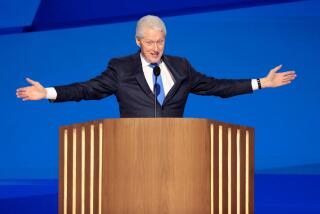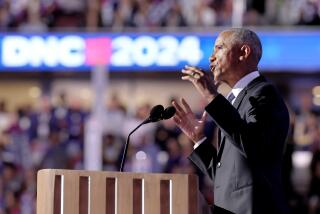Speaking up for eloquence
May I offer a few words in defense of eloquence? You wouldnât think that eloquence is the sort of thing that needs defending, but it has taken some hits during the presidential primaries. Other sorts of speaking skills went pretty much uncriticized.
Hillary Rodham Clinton, for instance, was marvelously articulate at times, and no one saw any reason to complain about that. Mitt Romney was praised as a smooth talker -- although when I listened to him, I found myself glancing around for the PowerPoint screen. There was widespread admiration for Mike Huckabeeâs ability to make humorous remarks that didnât sound as if theyâd been manufactured in advance by staff.
But there was something dismissive when Barack Obamaâs eloquence was mentioned by other candidates, as if making inspiring speeches is an inconsequential pastime unconnected to the serious business of governing. The same tone was taken by most television commentators -- the people I have always lumped together, whether their TV appearances are on Sunday morning or not, as the Sabbath Gasbags. Speaking of Obamaâs ability to âfill a stadium,â they sounded like particularly esoteric academics discussing a colleague who was gauche enough to have produced a bestseller.
I agree with what Clinton said in January -- that passing the 1964 Civil Rights Act required both the inspirational language of the Rev. Martin Luther King Jr. and the persuasiveness of Lyndon B. Johnson. Denouncing that remark as disrespectful to King seemed to me an example of the âgotchaâ politics that weâve had to endure so much of during recent campaigns.
But it doesnât necessarily follow that (as she said, quoting former New York Gov. Mario Cuomo) âyou campaign in poetry and govern in prose.â
Obviously, a lot of governing is, to put it simply, boring. If it werenât, the media wouldnât be so much more interested in politics than they are in government. But there is a place for poetry. In fact, when Cuomo was himself considering a presidential run, it seemed to me that his eloquence was one of the stronger arguments for his candidacy; anybody familiar with the speech he gave on abortion at Notre Dame in 1984 had to regret the prospect of not ever being able to hear what he would have come up with as an inaugural address.
A president is not a prime minister. In our system, he is the head of state as well as the head of government. Itâs part of his job to comfort the American people in times of distress or inspire them to sacrifice for the greater good or, as Obama did in his January speech about the Rev. Jeremiah A. Wright Jr., get them thinking. Until Johnson ran into Vietnam, he was an effective president; if he had been able to speak the way Cuomo can speak, he would have been a more effective president.
When Johnson was brought low by the Vietnam War, the late Alf Landon, the wise former governor of Kansas (and Republican presidential candidate against Franklin D. Roosevelt) said something like this: âWhen he first came in, people said, âHeâs really a wheeler-dealer.â Now they say, âHeâs nothing but a wheeler-dealer.â â
--
I think what Landon meant was that Johnson had no capital to spend when he reached a rough patch. Dwight Eisenhowerâs capital was the respect that came from having orchestrated victory in Europe. John F. Kennedyâs was his charm. Among todayâs candidates, John McCain is cushioned by the admiration of virtually all Americans for his courageous military service in Vietnam. Obama has eloquence.
An American president is judged partly by how much of his program makes its way through Congress. But, even when his own party is in the majority, he has no direct control over Congress in the way a prime minister has control over parliament. He gets his way partly by the arm-twisting and deal-making that Johnson did so well, but partly through judicious use of his capital. I suspect that a congressman contemplating whether he wanted to cross President Obama would be thinking not âhe can fill a stadiumâ but âhe can fill a stadium in my district.â That would come close to governing in poetry.
More to Read
Get the L.A. Times Politics newsletter
Deeply reported insights into legislation, politics and policy from Sacramento, Washington and beyond. In your inbox three times per week.
You may occasionally receive promotional content from the Los Angeles Times.










